 stripped down and showing off all that muscular stuff. My father was a big man too but I didn't inherit any of that stuff, eh?
stripped down and showing off all that muscular stuff. My father was a big man too but I didn't inherit any of that stuff, eh?
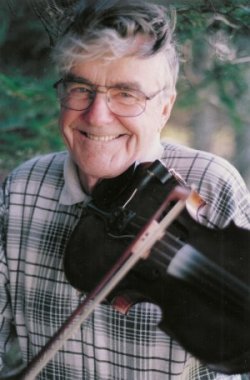
The following autobiography by one of Nova Scotia's greatest folk violinists has been prepared for Rounder CD 7043 "Willie Kennedy, Cape Breton Violin," scheduled for release summer, 2002 (visit www.rounder.com/rounder/nat for further details). It supplies a very direct and accurate picture, I think, of the social setting that allowed traditional fiddling to survive so robustly in twentieth-century Cape Breton. I might add that the Gordon MacQuarrie pamphlet that Willie mentions is entitled The Cape Breton Collection and was published in 1940.
The CD is produced by Morgan MacQuarrie and myself. The accompanist is Gordon MacLean. The musical transcriptions are provided by David Greenberg and Kate Dunlay and the raw interview transcriptions were prepared by Liza Webster. The older photos are from Willie and his sister Margaret MacNeil and the newer ones by myself. Morgan and I would especially like to thank Bill Nowlin for his support in this project.
Mark Wilson
I was born on the fifteenth of August in the year of 'twenty-five. My father played fiddle and his name was Danny Michael Kennedy. My mother was Euphemia MacAllen from Margaree Harbour before she married him and her uncle was Ronald Kennedy who was a well known fiddler in those days. So I guess I inherit music from both sides of my family. Like myself, my father was just an ear player but he was perfectly correct. You could be sure that if he learned a tune, he’d have it dead on - maybe I’m a little more careless. It's different today, with so many tune books out, but back in them times I don’t think there was too many books around, so you had to learn a lot of it by ear. Of course, my uncle Joe, my father’s brother, composed the music for a couple of tunes, two or three, that went in Gordon MacQuarrie's collection. There's one tune, he called The Little White House by the Lake - it's a pretty nice jig, eh? - and there's another one in there, talking about some lady that he knew, I think she was a MacIsaac or something like that.
Uncle Joe, by the way, lived in Inverness town, near the post office. He was a blacksmith and had been a great athlete when he was young. He held the record in the shot put for the Highland Games in Antigonish that held for fifty years. We have pictures of him and his brother around the house here,  stripped down and showing off all that muscular stuff. My father was a big man too but I didn't inherit any of that stuff, eh?
stripped down and showing off all that muscular stuff. My father was a big man too but I didn't inherit any of that stuff, eh?
My father and Morgan's dad, Jack MacQuarrie, used to play as a team, starting way back before my time. When I was knee high, they'd go out and maybe start at six in the evening and play until six in the morning and probably get two dollars or something like that - if they were lucky. It was a long haul anyway for playing back in those days, eh? Eventually Jack MacQuarrie pretty much quit the violin. He was building his house on the property over there and he used to tell Morgan, "It was either the fiddle or the farm."
It’s so far back that I was only a little kid, but there was a fellow named One Arm Campbell who put up a little building right down on the boundaries of our property. It's kind of swampy there but he put in a little store and sold cigarettes, food and things like that. I guess the business was going along pretty good, probably not making a heck of a lot, but it was only a small little shack anyway. Then he decided he’d put on a few dances. He built a little stage and he closed it pretty well all around, with cut outs for all the windows, but no roof on top. He decided to have my dad and Morgan's play for the dance. I remember the start of it. No piano, no guitar, no nothing - he had just the fiddles, the open air and a nice evening. Probably it was just coming on summer. So cars were very scarce. I don’t remember how old I was, but I was very interested in all this, because there'd be dances just a few feet down the driveway. "That’ll be great, eh? It'll be close by." So my father Danny Michael came along and Jack MacQuarrie and coming on nine o’clock they was all ready. But nobody came. Finally, a car started coming over the hill and One Arm Campbell got all excited, "Drive'er, boys, drive'er." That car just whizzed past. Nobody came at all; I was the only audience. So that was the beginning and the end of those dances. My father would say, "A good try, but it didn’t pan out."
Later on George MacLean used to have barn dances in a new barn he'd built out towards Scotsville - "North Lake", you’d call it, He turned it into a dance hall for so many years. It was a small place but he was getting big crowds there. I don’t know where he was putting the cattle and the hay. Then there was Edgewater Hall, over on the west side, right on the edge of the lake. Sandy MacLean was the fiddler but I didn’t go to too many of them, two or three times maybe. You know, we didn’t have a car in them times, so you'd either have to hitch hike or take quite a little walk to get over there.
Most of the families around here would cut pulpwood in the wintertime to earn a few extra bucks, just doing whatever you could to get by. Early on they used to use bucksaws. There was a knack to it - you and the other guy had to keep the same kind of rhythm. There were some guys that were pretty heavy on their end of it and their partners would say, "Don't be dragging your feet!" But you couldn’t cut much pulp that way, only a cord or two. The bucksaw was a big improvement there.
In any case, in 1954 my dad and I were just hauling pulp out of the woods. I was driving and my dad was just sitting on the load. We thought it was pretty solid but it wasn’t tied on that good. Those darned rubber tire wagons was just a bouncing and the logs took a heave up and he slid off. I didn’t know what to do with the horses - one of them was a young horse, too - but I got them across the road some way and went to the neighbors. I can’t really remember how we got him to the hospital but he stayed there paralyzed with a broken back for probably three months or so before he died. He just wasted away. He was seventy-seven at the time and had played the fiddle pretty well up to the time he died. He was a sweet player and, as I said, very correct. My mother died that same year.
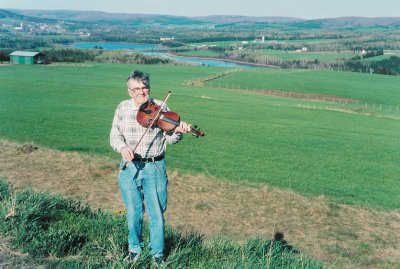 From when I was very young, six or seven, I was really for the violin music from hearing my father and my granduncle Ronald Kennedy play. The way our parish was divided - that was Broad Cove parish, eh? - we'd need to travel over to near his house when we wanted to go to mass because there was only the Presbyterian church in Kenloch. The way that the parish was, we'd need to go from Lake Ainsley and bypass Inverness on a dirt road that went up to Broad Cove. Mostly it was horse and buggy times back then, you know. I was the youngest in the family and I’d go for a weekend with my mother. And then we’d go to Ronald Kennedy’s, that wasn't far from the church, probably a half a mile to walk back in the woods a little piece, and were welcome to spend the whole weekend there. A big party then on Sunday afternoon, eh? Ronald Kennedy would play and his daughter was on the old pump organ. He played left-handed and was one of the really great old-time fiddlers that people still talk about. He was a very old man when I saw him but he played beautiful music. And there'd be friends of theirs that would come from Inverness and there were three of Ronald’s sons that played. So we’d have a whole afternoon, Sunday afternoon, of music, and then a big supper in the evening. So it would go on ‘til, not that late - people didn’t stay up that late in them times, because their parents were all older then. I don’t know how I really got home, but I guess my mother looked out for that.
From when I was very young, six or seven, I was really for the violin music from hearing my father and my granduncle Ronald Kennedy play. The way our parish was divided - that was Broad Cove parish, eh? - we'd need to travel over to near his house when we wanted to go to mass because there was only the Presbyterian church in Kenloch. The way that the parish was, we'd need to go from Lake Ainsley and bypass Inverness on a dirt road that went up to Broad Cove. Mostly it was horse and buggy times back then, you know. I was the youngest in the family and I’d go for a weekend with my mother. And then we’d go to Ronald Kennedy’s, that wasn't far from the church, probably a half a mile to walk back in the woods a little piece, and were welcome to spend the whole weekend there. A big party then on Sunday afternoon, eh? Ronald Kennedy would play and his daughter was on the old pump organ. He played left-handed and was one of the really great old-time fiddlers that people still talk about. He was a very old man when I saw him but he played beautiful music. And there'd be friends of theirs that would come from Inverness and there were three of Ronald’s sons that played. So we’d have a whole afternoon, Sunday afternoon, of music, and then a big supper in the evening. So it would go on ‘til, not that late - people didn’t stay up that late in them times, because their parents were all older then. I don’t know how I really got home, but I guess my mother looked out for that.
The first fiddle I got, Santa Claus brought me a little tin fiddle at Christmas time. My mother had gotten it from Eaton's department store through the mail. I've got a funny thing to tell you about it, but I shouldn’t dare tell it because John Archie Gillis might not like it. John Archie's a little younger than I am and was interested in the fiddling then too. His family lived way out in the woods, up back of Morgan’s old home. There’s a mountain and then there’s a valley below, and up on the other side, on the second mountain, okay, that's where the Gillises lived, working in the woods. His family spoke only Gaelic and John Archie didn't learn English until he went to school. In my own family, our parents never talked us in Gaelic, although all that my own father's parents talked was Gaelic although I think my mother didn’t know any Gaelic until she came up to Kenloch. And we kids kind of learned to understand it through hearing it, although I could never make a conversation in Gaelic. Anyway, John Archie came down the mountain to see my new fiddle and when he heard it, I remember him saying in Gaelic: "Why, there's no wind in the thing." I still laugh to think of it. That’s because it was just a tin fiddle, you know; a little thing like that wouldn’t make much sound.
But it was really sneaking the old fellow’s fiddle that got us boys going - it wasn’t the tin fiddle really. You couldn’t learn much on that thing; it was just a toy. There were two other boys in the family, Alex and Roddy, and then my sister Margaret. All of us boys were interested in the fiddle. My father’d be out in the barn and we'd get out the fiddle. He was such a quiet man that you wouldn’t know if he cared or not. Probably he liked for us to do that, eh?, but he wouldn’t tell you to do it; he wouldn’t let on that he knew it. Even if you did something wrong, he wouldn’t say anything - probably just give you a bad look. 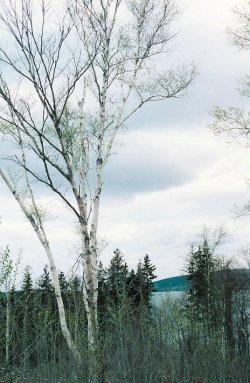 Alex was telling me that one time he got home late from a dance and our father was going to the barn. He didn’t come over, just gave Alex that scaring look that meant "you'd better smarten up, boy."
Alex was telling me that one time he got home late from a dance and our father was going to the barn. He didn’t come over, just gave Alex that scaring look that meant "you'd better smarten up, boy."
Roddy would have probably made a pretty good fiddler but in 1938 he drowned in Lake Ainslie on a Sunday afternoon when he was just eighteen. It was a hot day in July. He was up there eating dinner and went out with a little canoe a ways for swim. Usually he liked to have someone go out with him that was old enough but I guess his friends weren’t around to go with him. So he dived off and then he took those cramps, eh? The depth of the water wasn’t that awful but his arm and leg were bent up and he couldn’t do anything to save himself. I was just thirteen and I and my sister and another young fellow were going for a dip along the shore. We saw Roddy's canoe floating past with nobody in it, quite at peace. And we saw his clothes on the shore and all that but it never dawned on us that there was any trouble. So we had our dip and we went back home, eh? But another boy saw what happened from the shore. There was some older guys - they had a old Model T - that were coming back from being in Inverness to church about four o’clock. And the news was Roddy was missing, eh? The way it was then you didn’t go to an undertaker but the body was taken right in on the floor. My mother was never herself after that; Roddy was the oldest of the boys, you know, the favorite... It was quite the news for a small place like Kenloch at that time, a drowning like that, a sudden thing.
So on and on like that. I was probably six, seven or eight when I started fiddling. There used to be more of Kenloch than there is today: the old dance hall, the little train station and four little stores going full blast. There was a fellow there from Broad Cove working as a clerk and he knew they were having a little concert over at a school, in one of the little one-room schools they had then. So this guy knew I was playing a few tunes and wanted me to go and play at this concert, eh? And there was a prize for whoever was the top dog. I was so small that my feet wouldn’t dangle and touch the floor - they just went straight out. But I got the prize of two dollars. What do you think of that now? In those days that was pretty good money. Of course, I was such a kid; the judges just felt for me, I guess. But I was pretty proud of winning that prize.
The place where Morgan and I lived is called Loch Ban and they had a dance hall up in Kenloch - it's long gone now. But it was the main hall in this region back in them days. It was just a mile from our farm to the hall and I used to walk there from the time I was very young. When I'd walk there on a nice calm night, there'd be just two fiddles and the piano and in the summer time the doors would be wide open, and, boy, when I'd hear that music, it would just put a thrill into me - I'd just get a rising in my hair. Maybe it'd be Sandy MacLean and Angus Allan Gillis on the violins or Malcolm Beaton with Sandy. I’d just feel the music lift me as I came near the hall. Oh, the thrill that was in that, eh? It was just a little stage with a railing around it and I'd just hang onto that all night and swallow up the stuff. 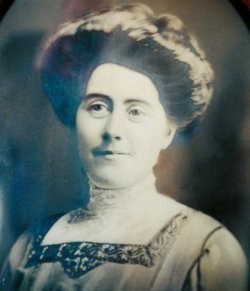 I never danced very much, maybe one set or so: I was more interested in getting all those tunes in my head.
I never danced very much, maybe one set or so: I was more interested in getting all those tunes in my head.
I was pretty young at the time. My mother would say, "You be home at ten o’clock." Ten o’clock?. Well, the dance wouldn’t even get going by then. So it was pretty tempting to hang on until about midnight and just try to squeeze in the house after that. Well, it was all lamplight then - no electricity, just lanterns in the hall, hanging on the side of the wall. So I’d probably trip over a chair or something sneaking in. I'd hear my mother in the darkness: "I thought I told you to be home at ten o’clock". I'd get a good tongue lashing, I suppose, but she never said it with anger or get up and give me a whipping or anything. And my father wouldn’t say nothing, eh? So the next Friday night it would be the same thing - I wouldn’t learn, you know.
The owner of the hall was named Malcolm MacQuarrie and he recognized that I loved this stuff so much. When we went to those dances, sometimes we didn’t have five cents. It was twenty-five cents to get in but I would be lucky if I had ten cents or fifteen. Malcolm would see me and the other kids standing outside at the door and say, "‘Go ahead on in." You never forget those things; he was really good to kids, you know, and I thought a lot of Malcolm MacQuarrie. Poor Malcolm, he didn’t make no fortune at them dances, eh? You know, he was lucky if he earned enough to pay the musicians. Well, he was paying me ten dollars a night when I played there later on with Angus Allan Gillis who probably got twenty or maybe twenty-five dollars himself because he was the main fiddler and had to drive so much further than I did. And then there was the pianist to be paid, too. So if Malcolm paid forty or fifty dollars out for those sessions, that would be quite a bit money back then, eh? You'd have to get a lot of quarters for that, you know. And sometimes his customers couldn't afford more than a dime!
My brother Alex is a little older than I, by about three years. So he’d go over and Malcolm would have him wax up the floor with the powder wax. You know, you’d chip the wax from a block with a pen knife and it made the floor a little bit slippery, but not too slippery, eh? It was a beautiful floor for dancing. The rest of the building wasn't much and that hardwood floor was the best part of the hall. A beautiful floor for dancing, oh boy. Of course, there was always dirt coming in on people's feet and it could get very dusty at those old time dances. So the hall would have to be swept out and my brother would help with that too. And Malcolm would let us get in free if we’d help put the wax on the floor before the dance.
But, oh, there was some wicked fights at those dances. Most of it would be outside, but the dance would be over if it was started in the hall. They'd kick the lanterns out and it'd be all dark. And sharp pointed shoes was the style back then and some of them would put the kicks to you. Some of them were tough, hard people, too. I remember after one of the dances, a guy who just cleaned out the hall. He picked up another fellow with a vest on and fired him completely across that all, sliding on that hardwood floor. It was wicked - there were some wild nights there.
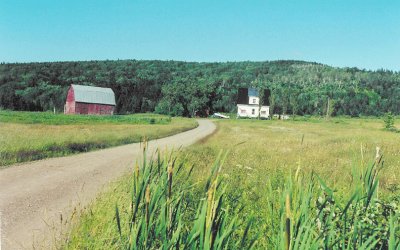 When Alex comes home from Boston for the summer, he’ll be bringing those old things up way back in them years. We have a lot of laughs: going to Kenloch and the dances and the girls, the young girls. There were some kids that would walk from Inverness right up the railroad tracks. That was about fifteen miles. Some of the young ones'd walk up and they’d probably have to walk back too. But Malcolm, the fellow that owned the hall, had a car and sometimes he’d run some of the girls down after the dance. Ones that had a distance to go walk, you know.
When Alex comes home from Boston for the summer, he’ll be bringing those old things up way back in them years. We have a lot of laughs: going to Kenloch and the dances and the girls, the young girls. There were some kids that would walk from Inverness right up the railroad tracks. That was about fifteen miles. Some of the young ones'd walk up and they’d probably have to walk back too. But Malcolm, the fellow that owned the hall, had a car and sometimes he’d run some of the girls down after the dance. Ones that had a distance to go walk, you know.
In the 'forties old Kenloch Hall was the main dance in our area. Then they started dances in the old Labor Temple in Inverness town on Saturday nights; they had Winston Fitzgerald there pretty well for the summer months. After Angus Allan, Joe MacLean played in Kenloch for a summer and after that Buddy McMaster and I think that ended it, sometime in the 'fifties. They started a dance hall over in a section of Brookside that took the crowd away from Kenloch and so Malcolm MacQuarrie finally threw in the towel. And then Glenville had a big hall and it was just like a picnic on their nights. When Winston Scotty was playing at the Labor Temple, two or three of us would go down on the train and probably take a show in at the theater and then go to the dance after that. We’d go down on the train, fifteen cents, and then, if three of four guys went down, we’d get a taxi for two dollars back to Kenloch. We’d all chip in probably fifty cents a piece or something. We were getting a little older and the money was getting a little better. So on and on like that.
In those early days at Kenloch Hall you'd hear Angus Allan Gillis and Sandy MacLean playing as a team. Or Malcolm Beaton and Sandy. Oh, they were all powerful fiddlers. Sandy lived out along Foot Cape Road and I sometimes think he's about my pick for the best fiddler - I never saw a fellow with such a bow hand. 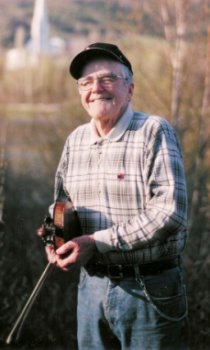 He'd use the full length of the bow from one end to the other. I think he got a lot of pointers from a professor down in the States around Boston somewheres. Angus Allan was a farmer and a woodsman from Gillisdale. He had a lot of woods that he worked in during the winter months, cutting pulp, like a lot of us did back then. He was a husky man and ran farm with a lot of cattle and milk cows and did it all the hard way, milking by hand. And he was some woodsman, too. He'd go to the woods and probably put eight hours in there cutting pulp with just a buck saw - there wasn’t a power saw in them times, eh? He'd cut a lot of wood in the day, then play for a dance until one o’clock in the morning and then drive home from Kenloch down to West Margaree. Angus Allan was very courteous and quite the gentleman. He was able to get along with all the other fiddle players around there, even the mean ones.
He'd use the full length of the bow from one end to the other. I think he got a lot of pointers from a professor down in the States around Boston somewheres. Angus Allan was a farmer and a woodsman from Gillisdale. He had a lot of woods that he worked in during the winter months, cutting pulp, like a lot of us did back then. He was a husky man and ran farm with a lot of cattle and milk cows and did it all the hard way, milking by hand. And he was some woodsman, too. He'd go to the woods and probably put eight hours in there cutting pulp with just a buck saw - there wasn’t a power saw in them times, eh? He'd cut a lot of wood in the day, then play for a dance until one o’clock in the morning and then drive home from Kenloch down to West Margaree. Angus Allan was very courteous and quite the gentleman. He was able to get along with all the other fiddle players around there, even the mean ones.
Sandy and Malcolm Beaton played at the hall quite a bit too. Sandy was older than Malcolm and Malcolm had just followed him all the way in music. You’d think it was just the one fiddle when they played, they were so close. And a very good fiddler Malcolm was by himself, a terrific fiddler. He used to come to our old home and stay over night and of course have the drinks and a lot of music. He used to live near Strathlorne. There's a cemetery there; if you’re going into Inverness, it’s on the left-hand side. Well, there wasn’t many houses out along there then. My mother asked Malcolm one time, "Who are your closest neighbors?" "Th th the graveyard’, he replied,"they're quiet neighbors’. He had a lot of wit like that and he stuttered a bit to make it funnier, you know. When he was playing, he could almost tell you a story at the same time. Myself - I'd be lucky if I could answer "yes" or "no." There’s a lot of good stories others could tell you about Malcolm - he was such a fine guy. But he was hard on himself with the drinks and everything, eating the dust in those old dances. He was only in his thirties when he died from tuberculosis. He was just a young man - what a shame.
And his brother, Neil Archie Beaton, was a very good fiddler too and he composed one of the jigs I've put on the CD. He wasn’t quite as good a fiddler but he had more music than Malcolm, eh? Poor Neil Archie. He had no case for the fiddle and would carry it around with nothing under the arm and probably poke it under the dance hall before he’d go out there. He was quite the guy, eh?
Sometimes Danny Campbell would come from Glenora Falls to play with Angus Allan, but that's pretty far away. Then there was a Charlie MacKinnon from the lake. He was a powerful fiddler, my God he was, as Angus Allan was as well. He was strong too, a big husky guy, and a good fellow too. He was just like two fiddles; you wouldn’t believe how loud he was when he’d get up to play. Later he left Lake Ainsley and moved to Halifax for work. I've never heard too many talking about Charlie, but he was a very powerful fiddler.
You see, there was no amps or mikes then and you had to make volume in some way, because you couldn't hear a single fiddler very far away in a crowded hall. So usually two fiddlers had to team up to play for a dance, especially in the days before there were pianos. 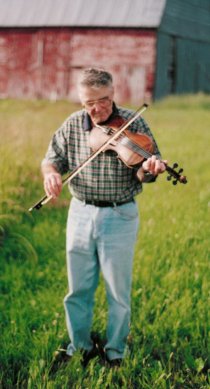 And they'd often tune up their fiddles into high bass to get more volume. Angus Allan was pretty powerful with that, boy, and Sandy, too. I think I used to do a little of that with the bass string pulled up to A, but I've lost out on that - I couldn’t go near that now. All that pressure is hard on the violin and you don't need to play so loud anymore. I can’t remember if my father retuned his violin or not; I don’t think he did.
And they'd often tune up their fiddles into high bass to get more volume. Angus Allan was pretty powerful with that, boy, and Sandy, too. I think I used to do a little of that with the bass string pulled up to A, but I've lost out on that - I couldn’t go near that now. All that pressure is hard on the violin and you don't need to play so loud anymore. I can’t remember if my father retuned his violin or not; I don’t think he did.
Boy, they had great piano players in Kenloch Hall too. There was Mary MacLean Cameron - "Muddy" they called her - she was a great piano player. Another one was Mary Maggie Smith, who became a Varnier. Muddy, she’s gone now, but Mary Maggie is still living and she plays a bit too, you know. They were great piano players.
When I was pretty young - probably fifteen, still a teenager, put it that way - Malcolm MacQuarrie asked if I’d like to play with Angus Allan for the dances. I was pretty proud of myself to be able to play with a top notcher, eh? And I got ten dollars a night. Wow, that was really something then. It's hard to think what you have to pay to mean the same to a kid nowadays? So I played a whole year with Angus Allan and he was such a gentleman, Angus Allan was. He'd want me to play my stuff and he’d just follow me, which a lot of the others wouldn't do. ![]() But I didn’t have enough to play for a whole dance, so I’d have to fit in somewhere with him, follow him as best I could. I learned a lot of my older tunes that summer. (Sound clip - King George IV Strathspey : Transcription)
But I didn’t have enough to play for a whole dance, so I’d have to fit in somewhere with him, follow him as best I could. I learned a lot of my older tunes that summer. (Sound clip - King George IV Strathspey : Transcription)
Those old dances were so leisurely. Maybe Angus Allan would start talking about farming or telling a story about someone and it'd be twenty minutes between sets. There were spittoons all around the hall and the older folks were chewing tobacco. I remember once that Angus Allan was finishing a story and let a big tobacco shower fly but missed his aim and, boy, it got all over the keyboard of the piano.
At that time you didn’t need so many tunes for a figure of a set, because the dancers didn't drag them on so long. You see, they always had a prompter then to control the sets. But nowadays there’s no prompter and now, God Almighty, you need about twenty tunes to play for a figure. Morgan and I remember going to see Winston Scotty in Inverness. All he needed then was two tunes for a figure. It wasn't that he played the same tune all night - maybe he'd play a tune two or three times through - but the figures were shorter, eh? Once upon a time they used to have four figures in a set but they’ve stuck with the three since back then: two slow figures with jigs and then the fast reels. Of course, the different places you'll go they dance a little differently.
It sometimes seems to me that the dancing for a Scotch Four has gotten kinda mechanical too. Not too long ago I saw this girl dance. Another fiddler started to play for a Scotch Four and she done all right on the strathspey but when he turned on the reel, she just stopped and stared at him, because he hadn't played it through the right number of times. With these younger dancers it's all a set thing - that's what I mean by "mechanical." She had gone to somebody that’s teaching the dancing, you know, but it’s not in her genes. Now the older fellows that learned on the barn floor won’t expect you to play strathspeys a set number of times, you know; they go about it as individually as the fiddle players do. The older ones here, the great dancers, just made their own steps humming to themselves out in the barn and there's nothing mechanical about that old style, just natural ability. All close to the floor, not high in the air
Now I pretty much stopped playing the fiddle in the late 'fifties. When Morgan was still around, we’d be gallivanting around and having the parties. We'd always carry a fiddle around with us but we weren't too serious about music. 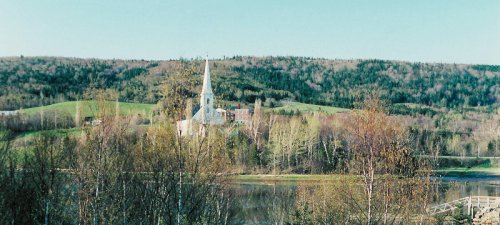 When Morgan left Cape Breton, the bottom dropped out of everything in Kenloch and there was really nothing for me to play for anymore. I came up to Mabou in probably 'sixty-six and worked for the road department. I think if I'd stayed in Kenloch I wouldn’t be playing the fiddle yet. But in Mabou I kind of fit in with the local crowd. Father Francis Cameron, who now has a parish in St Peters, was our parish priest then and he is a fiddler. And he started getting some of us old-time fiddlers together. He’d call me up in the wintertime on a cold night. "Wouldn’t this be a good night for a few tunes?" he'd ask. I'd say, "Sure, why not?" We’d go over, a bunch of us. There was Sandy Cameron who didn't play much because he’s all full of arthritis in the shoulder. And Gregory Campbell and Kenneth Francis MacDonald would come there and Flora MacNeil who lives down the glen now. We'd all land over at the Gleeb House and Father Francis would give us a snack and sometime maybe a little drink and on and on like that. There was a number of years I hardly ever played down home, eh? When I first got up here, I'd go to the odd dance and every once in awhile Donald Angus Beaton would ask me to play a set for him, not very much but an odd time I’d play a set over there. But I was out of practice until Father Francis kind of got us all rolling.
When Morgan left Cape Breton, the bottom dropped out of everything in Kenloch and there was really nothing for me to play for anymore. I came up to Mabou in probably 'sixty-six and worked for the road department. I think if I'd stayed in Kenloch I wouldn’t be playing the fiddle yet. But in Mabou I kind of fit in with the local crowd. Father Francis Cameron, who now has a parish in St Peters, was our parish priest then and he is a fiddler. And he started getting some of us old-time fiddlers together. He’d call me up in the wintertime on a cold night. "Wouldn’t this be a good night for a few tunes?" he'd ask. I'd say, "Sure, why not?" We’d go over, a bunch of us. There was Sandy Cameron who didn't play much because he’s all full of arthritis in the shoulder. And Gregory Campbell and Kenneth Francis MacDonald would come there and Flora MacNeil who lives down the glen now. We'd all land over at the Gleeb House and Father Francis would give us a snack and sometime maybe a little drink and on and on like that. There was a number of years I hardly ever played down home, eh? When I first got up here, I'd go to the odd dance and every once in awhile Donald Angus Beaton would ask me to play a set for him, not very much but an odd time I’d play a set over there. But I was out of practice until Father Francis kind of got us all rolling.
And then when that 'Vanishing Fiddler' show came on, geez, that got everybody on the island all whooped all up. That was a television show in the early 'seventies that explained how few young people were taking up the fiddle in Cape Breton. Well, the people around here didn’t like this very much at all. It woke all of us up, eh? "We've got to get our fiddles going." So that was a great thing he done. They had that first Glendale festival in 1973 and it's just gone on from there.
I went back to live for two or three years at the old place, but when my sister Margaret’s husband died, I came back to Mabou to stay with her, now that her family is all away. 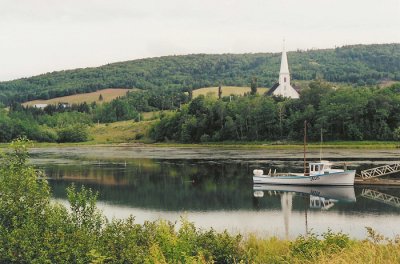 There was quite a space of years that I didn’t even have a fiddle. You couldn't even keep the neck on my father’s old fiddle. When I came up to Mabou, a friend had lent me an old fiddle. It was just an old Eaton's violin and would be classed as a pretty poor instrument but I was kind of proud of it. Well, Dan R MacDonald would come up here on a Sunday afternoon and so one day I showed that fiddle to Dan R who just brushed the strings and said "not too bad" and passed it back to me. At the time I was kind of puzzled, "I wonder why he wouldn’t he try it?" Well, that was enough for Dan R. There was a nice handmade fiddle in Heinl's music store in Toronto that he was awfully anxious to get and he had a buddy bring it back to Cape Breton. Then Dan R came up to me and said, "Willie, you should have a good fiddle and I’ll give you this one for a while." I replied, "Dan R, I wouldn't want to take it; I’m afraid something would happen to it." And he said in that funny way of his, "What the Jesus is going to happen to it?" And then he suggested, "If you give me eighty-five dollars and then twenty dollars a month, you can have it." Geez, it’s a good fiddle. Dan R also gave me a bow and an old case with it. When I had the bow re-haired in P.E.I., the guy there priced it at a hundred and seventy-five dollars. What do you think of that? The bow was worth more than the fiddle. That was Dan R - boy, you know he just about give that bow to me. He was all heart like that, Dan R. Now the Dan R fiddle is softer than the one I used on the CD. That one came from my uncle in Boston, Johnny Kennedy. I never heard him play, but I'm told he was a sweet player.
There was quite a space of years that I didn’t even have a fiddle. You couldn't even keep the neck on my father’s old fiddle. When I came up to Mabou, a friend had lent me an old fiddle. It was just an old Eaton's violin and would be classed as a pretty poor instrument but I was kind of proud of it. Well, Dan R MacDonald would come up here on a Sunday afternoon and so one day I showed that fiddle to Dan R who just brushed the strings and said "not too bad" and passed it back to me. At the time I was kind of puzzled, "I wonder why he wouldn’t he try it?" Well, that was enough for Dan R. There was a nice handmade fiddle in Heinl's music store in Toronto that he was awfully anxious to get and he had a buddy bring it back to Cape Breton. Then Dan R came up to me and said, "Willie, you should have a good fiddle and I’ll give you this one for a while." I replied, "Dan R, I wouldn't want to take it; I’m afraid something would happen to it." And he said in that funny way of his, "What the Jesus is going to happen to it?" And then he suggested, "If you give me eighty-five dollars and then twenty dollars a month, you can have it." Geez, it’s a good fiddle. Dan R also gave me a bow and an old case with it. When I had the bow re-haired in P.E.I., the guy there priced it at a hundred and seventy-five dollars. What do you think of that? The bow was worth more than the fiddle. That was Dan R - boy, you know he just about give that bow to me. He was all heart like that, Dan R. Now the Dan R fiddle is softer than the one I used on the CD. That one came from my uncle in Boston, Johnny Kennedy. I never heard him play, but I'm told he was a sweet player.
The young fiddlers up here were starting to play pretty fast about the time Dan R died. "They're like fast cars," he'd say, "but if you go that fast, you'll miss all the scenery." And he was pretty right there - a lot of what they're playing is just like a straight line now. There’s no little tic-tac-toes in the music; no grace notes. They're skipping all those notes, you know, they’re not hitting them. Most of them don’t even know they should be there; they think it's good as long as it’s fast, eh? But think of Donald Angus Beaton. Old Angus was lively, eh? He didn’t have to be fast but he put a lot of life right into it. But I don’t hear the old Scottish feel in a lot of the music now, like I used to hear from the older fiddlers I've been talking about. You have to put them little things into the music to get that old-time feeling out of it - ![]() it's kind of hard to explain the kind of the feel I mean. It comes naturally, you know, to Morgan and I from the way we heard it years ago. Otherwise, it all becomes too mechanical. But I think I've got the old stuff in me so deep I can't do it any other way. (Sound clip - King's Reel : Transcription)
it's kind of hard to explain the kind of the feel I mean. It comes naturally, you know, to Morgan and I from the way we heard it years ago. Otherwise, it all becomes too mechanical. But I think I've got the old stuff in me so deep I can't do it any other way. (Sound clip - King's Reel : Transcription)
Way back before I was born there was the old priest, smashing or burning all the fiddles in Mabou. There were musicians back then who'd give him a poor fiddle to smash and keep a better one hidden. Eventually the Cape Bretoners got wiser and stood up for themselves. But what’s the harm in violin music, you know? I've hear some say, "I don’t want to go to heaven unless there’s music there" and I guess I about agree with that, eh?
Willie Kennedy
Article MT090
| Top of page | Articles | Home Page | Reviews | News | Editorial | Map |